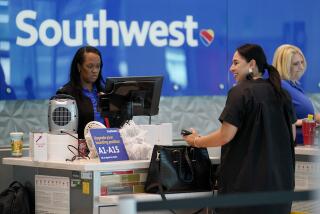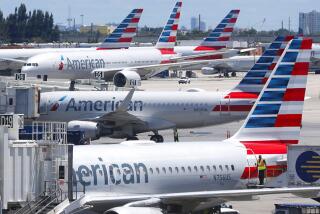Fewer people fly first or business class
- Share via
The number of people flying first or business class took a steep dive in September as businesses continued to reduce travel budgets and leisure trips declined with the end of the heavy summer travel season.
The number of premium travelers worldwide fell 14% in September compared with the same period last year, and dropped 23% from September 2007, according to a report released Tuesday by the International Air Transport Assn.
The drop in premium travelers was significant because it came during a time when leisure travel slowed considerably, and airlines relied most on the higher ticket prices paid by business customers.
The steepest drop in premium passenger numbers came on those routes within North America and within Europe. By contrast, business travel throughout the Middle East remained strong.
Meanwhile, the number of leisure travelers, typically represented by families flying in economy or coach seating, increased 1.2% in September over the same month last year but was down slightly from August, according to the monthly report.
Both business and leisure travel numbers had begun to show improvements during the heavy summer travel season. But that trend ended in September.
Analysts said the latest passenger traffic numbers were disappointing but not surprising. With major worldwide industries continuing to lay off workers, analysts say travel budgets will continue to shrink. Making matters worse for the airlines, analysts say many companies have begun to instruct employees to fly in the economy or coach sections to save money.
“It’s disappointing because you are wondering where the bottom is,” said Ray Neidl, a New York-based airline consultant for Calyon Securities.
Julius Maldutis, an economist and airline consultant for Aviation Dynamics Inc., also had a grim outlook.
“The airlines are taking a pummeling,” he said. “The big question is when will the airlines show a significant recovery.”
Analysts don’t expect the upcoming holiday season to pull the airlines from this slump, since holiday travelers typically pay discounted rates by reserving tickets far in advance.
However, if business travel numbers do not begin to show improvement in the next few months, analysts say, the airlines have no choice but to make further capacity cuts -- eliminating flights and grounding airplanes -- and perhaps increasing ticket prices and fees for baggage, food and other amenities.
Steve Lott, a spokesman for the transport association, said the airline industry was already poised to lose $11 billion in revenue in 2009.
But he said the airlines weren’t shocked by the declining numbers. Until the overall economy shows significant improvement, fewer travelers will buy those premium seats in the front of the plane, he said.
One sign of optimism for the airline industry in the report was an improvement in business travel throughout Central America, which had been severely affected by H1N1 flu, also known as swine flu. Within Central America, the number of premium travelers dropped 2.3% in September, a dramatic improvement from the 34% decline in August. However, the report suggested that further flu outbreaks during the winter months could signal another slump in airline passengers in the region.
--
More to Read
Inside the business of entertainment
The Wide Shot brings you news, analysis and insights on everything from streaming wars to production — and what it all means for the future.
You may occasionally receive promotional content from the Los Angeles Times.











